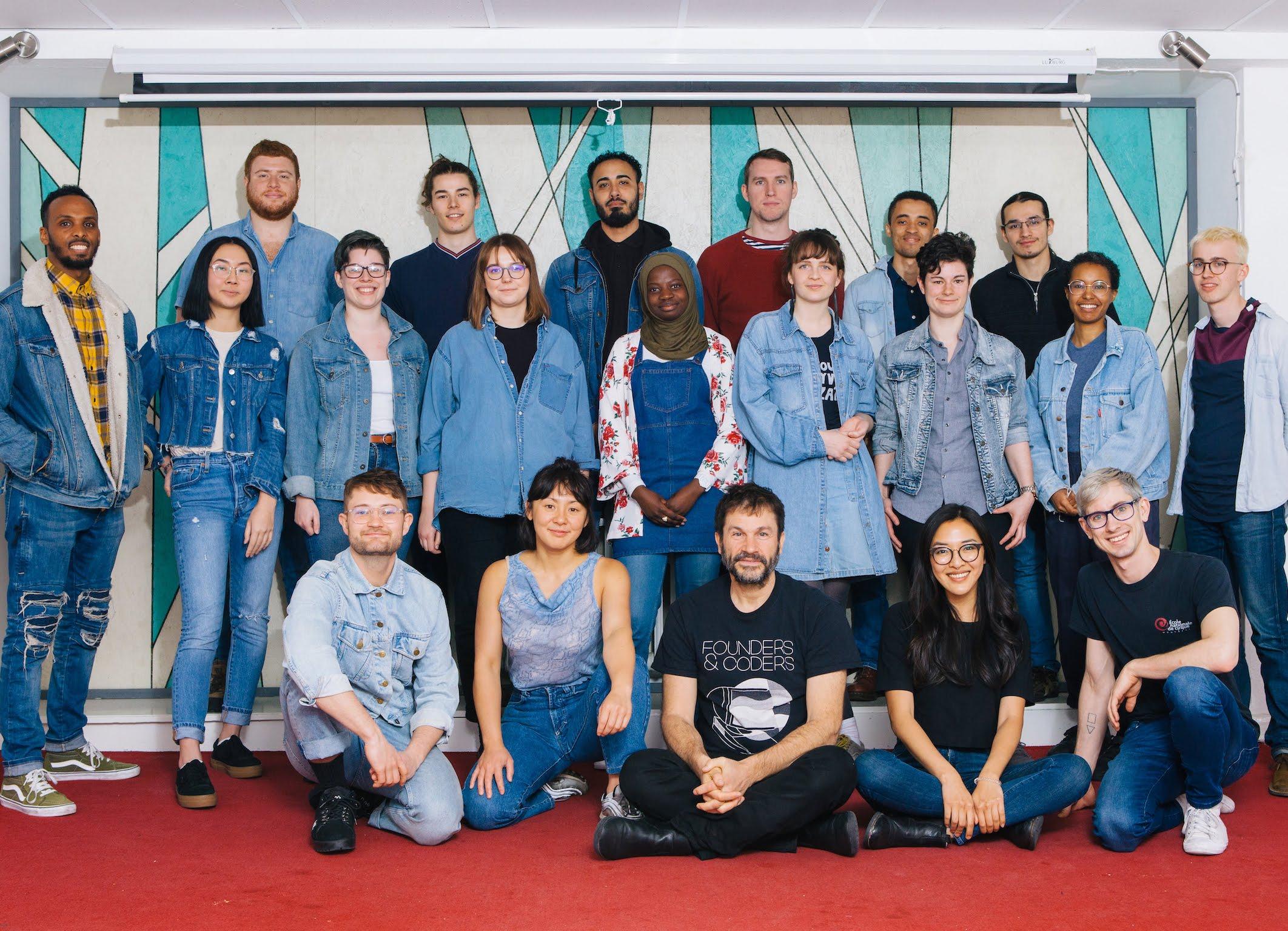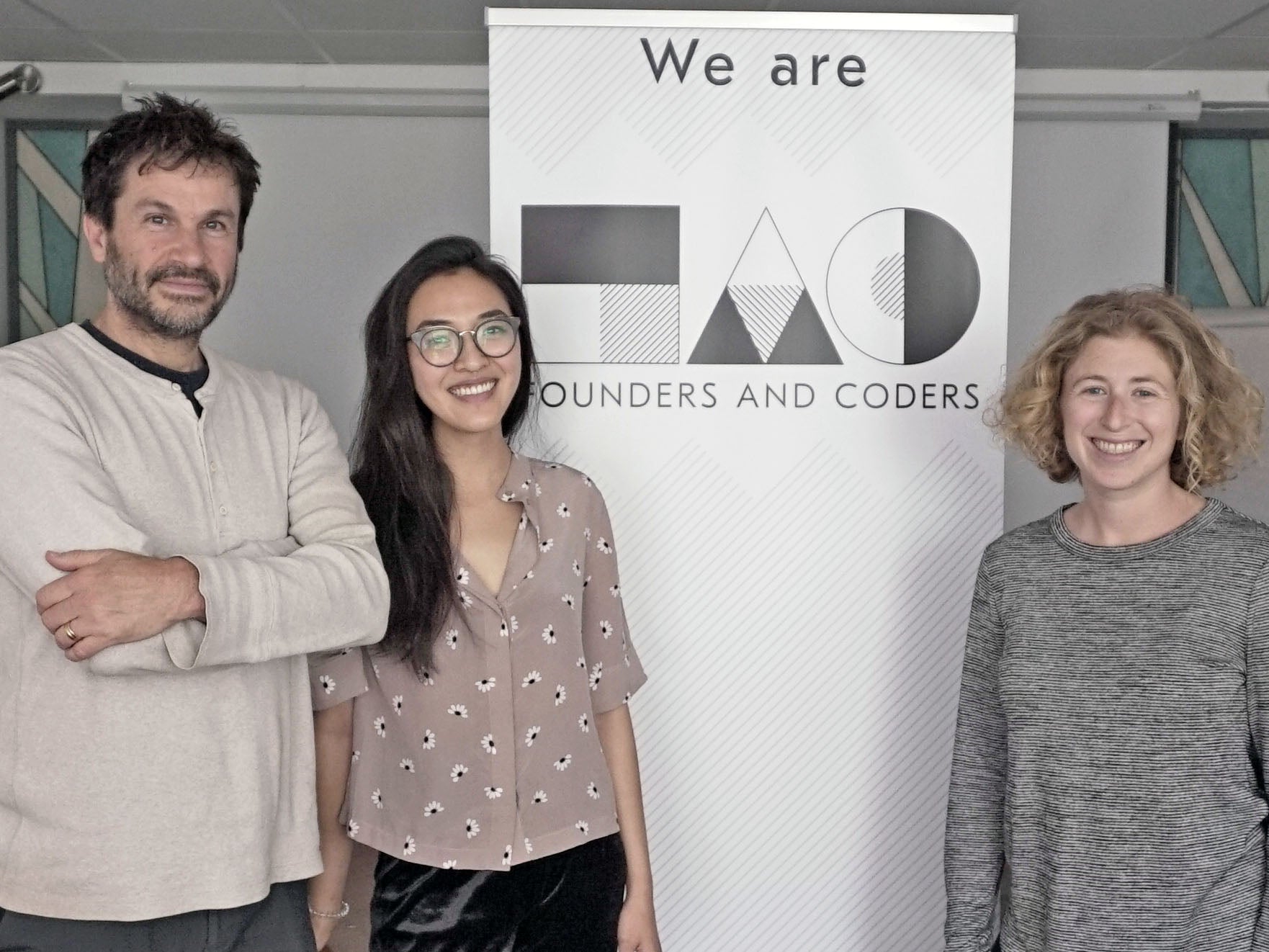The free coding academy training software developers for jobs in London – and Gaza
Software engineers are the most in-demand professionals in 2019 according to one job search company

It’s just after lunch on a Wednesday in May, and Freddie Preece is preparing to dedicate the rest of his day to building an app about public toilets.
“We’re calling it Tinkl,” he says with a grin. He opens his laptop to show the design of the app, including where the user will put in their location and gender to find the nearest available bathroom. “The tagline will be Find A Suitable Toilet or Fast – for when you just can’t wait!”
Preece is one of 16 students taking part in Founders and Coders, a free, 18-week course in software development at Space4, a co-working space in Islington, north London. Founders and Coders is designed differently to most software courses on the market. For a start, it’s free. There are no paid teachers – learning is peer-led, rather than top down. And the classes are filled with an intentionally diverse set of students, picked for their curiosity and their social skills as much as for their love of code.
Each week, the students present the project they have been working on to the rest of the class. “If you fail, that’s fine, because that’s the way we learn,” Preece says. “That competitive element isn’t there. The whole course is about learning from other people.”

Founders and Coders was established by Dan Sofer, a former software engineer, in 2013. In 2012, Sofer had just finished work on a big project connected to the Olympics and was looking to learn something new, so he started an online course about machine learning. “I loved the idea of learning using online materials, but I didn’t finish the course because I got bored of learning on my own,” he says.
The next time he started an online course, he organised a meet-up for other people on the course in his area at the British Library. It turned into a series of self-organised gatherings, based around online courses. Sofer sought an evening venue in Camden and found one that was vacant for the whole day, so he began hosting courses where he would help people to complete free schemes of work online. Over time, this has evolved into a bespoke curriculum based around building apps in groups.
At the end of the third course, Sofer asked the cohort if he could charge a little for teaching, to pay the bills, and the answer was a heartfelt no. “They said, ‘You can’t charge, you have to find another way,’” he remembers over pizza on the sofa at Space4.
So Founders and Coders evolved into an employment agency, training students to junior-developer standard and finding them a job at the end of their course. Founders and Coders takes 15 per cent of their first year’s salary to put towards the running costs of the business.
It works because of one factor. “The demand for developers is ridiculous,” Sofer says. “Almost any company uses software in all aspects of their business.”
Software engineers are the most in-demand professionals in 2019, according to Adzuna, the job search agency, which recorded more than 17,000 openings in December 2018. The average pay for software engineers is significantly higher than in other skilled jobs, at £51,300. But the time it takes to train, and the costs associated with training, are a big barrier for many, according to Yvonne Liu, co-founder of Founders and Coders.
“Our school is tuition free at the point of entry, which I think is the of the biggest barriers for people who are unemployed or wanting to switch careers,” she says. “But we do ask that people learn on their own or with each other prior to joining the programme.”
It usually takes students two or three months to complete the “pre-requisites”, a series of tasks including building a one-page site. The candidate is encouraged to come to meet-ups run by volunteer mentors from the previous cohort, where they continue their learning by teaching the next in line.
Liu says that although Founders and Coders is focused on self-organising and learning, they have brought in people who might have switched careers and are particularly self-motivated. Sofer agrees that Founders and Coders sets itself apart by training developers who are not just technically excellent, but good at working with other people. “To be productive, a software developer has to be curious and dogged,” he says. “They have to be prepared to spend hours solving a problem. It’s really hard to find those people.”
Joe Friel had been working in influencer marketing for several years when he applied to Founders and Coders in 2017. “I was working in the digital space, looking at how you engage young people,” he says. “You become aware of how amoral tech is if it is not used properly. I saw that this was only going to become more important. So I wanted to get into the other side.”
After completing the 18-week Founders and Coders course, Friel was accepted onto the Founders programme, which offers bursaries for graduates who want to build their own companies. Through Founders, Friel has joined with developers from the Founders and Coders campuses in Gaza, Palestine, to start delivering digital projects that have a social impact through a new agency called Yalla. So far, Yalla has worked on Connect 5, a mental health training programme, and with Tempo, a charity that helps reward volunteer work with time credits.
Rather than exponential growth, Yalla is working towards a flat, cooperative organisational structure across international boundaries that delivers digital products with a positive impact. “We don’t want to become massive – growth isn’t always an indicator of success,” Friel says. “But it would be cool if there were 200 Yallas with interesting collaborations.”
Sofer says Yalla is an example of what the Founders and Coders model can achieve. “Twelve months ago neither Joe nor the other founders could code,” he says. “Now they are running a digital agency with four developers in Gaza.”
The big challenge for Founders and Coders is whether it can export its model to places closer to home where there is a demand for training. Sofer and the team have had conversations about spin-offs in places including Belfast, Cardiff, Newport, Manchester and Bristol.
But outside of London, the tech job market is different, Sofer says: “It’s more back office than startup. The trick in Gaza is to get the developers up to a higher standard than here because the job market is less forgiving. They do get work because the cost base is low and there is a Palestinian diaspora.”
Will that trick work elsewhere in the UK, where software developer jobs aren’t so in demand? “There’s definitely a need there and we can get good people there, the question is whether the local market can absorb those people,” he says.
Sofer believes that in places where the job market cannot support new trainees, they should find opportunities to work remotely. “Yalla has already bridged that gap but it’s been relatively easy to integrate,” he says. ”People might come from different cultures, but they have all been through the same programme.”
Join our commenting forum
Join thought-provoking conversations, follow other Independent readers and see their replies
Comments
Bookmark popover
Removed from bookmarks